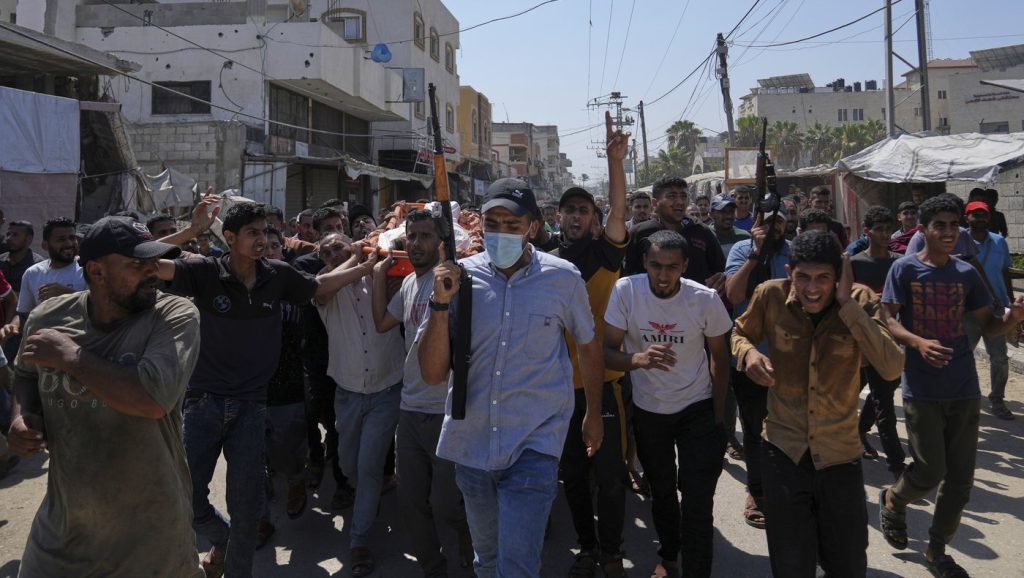Amnesty International released a report on Thursday accusing a controversial aid distribution system in Gaza, backed by the U.S. and Israeli government, of employing starvation tactics against Palestinians, thereby perpetuating genocide during the ongoing conflict with Hamas. The U.K.-based human rights organization criticized both Israel and the Gaza Humanitarian Foundation (GHF), which has been endorsed by the U.S. and Israel to take over the aid distribution previously managed by the United Nations.
In response to Amnesty's allegations, Israel's foreign minister condemned the report, accusing the organization of aligning itself with Hamas and propagating its false narratives. According to Gaza's Health Ministry, over 500 Palestinians have been killed in proximity to GHF distribution centers in the past month, with eyewitnesses claiming that Israeli military forces have opened fire on crowds gathering at these sites, which are secured by private contractors and located near Israeli military positions.
Amnesty's report highlighted the dangerous conditions at GHF's distribution hubs, suggesting that Israel has transformed the process of seeking aid into a perilous endeavor for starving Palestinians. The report described the situation as creating "a deadly mix of hunger and disease pushing the population past breaking point." Agnès Callamard, the secretary general of Amnesty International, stated that the continual loss of life among desperate Palestinians collecting aid is directly attributed to the deliberate targeting by Israeli forces and the hazardous means of aid distribution employed.
Israel's Rebuttal
The Israeli army defended its actions, claiming it only fires warning shots to manage crowd control and targets individuals deemed suspicious. Both the Foreign Ministry and COGAT, the Israeli agency responsible for coordinating aid to Gaza, reported that since May 19, they have facilitated the entry of over 3,000 aid trucks into the Gaza Strip, with GHF delivering food boxes equivalent to 56 million meals. However, humanitarian organizations contend that this amount fails to meet the enormous needs within Gaza, where food consumption reportedly reached critical lows, with food diversity at its lowest since the onset of the conflict.
The World Food Programme expressed concern in a June report about the prolonged closures of crossings, escalated violence, soaring food prices, and severely limited access to essential food supplies, which have all contributed to the decline in basic food availability.
Criticism of GHF Operations
Amnesty's report came on the heels of a statement from over 165 international charities and NGOs calling for the immediate cessation of GHF's operations. These organizations argue that the foundation's methods permit Israel to utilize food as a weapon, violate humanitarian principles, and prove ineffective in addressing the pressing humanitarian crisis. GHF, a secretive initiative led by an evangelical figure connected to former President Donald Trump, began distributing aid on May 26 after a nearly three-month blockade had left Gaza's population, exceeding 2 million, at risk of famine.
Witnesses in Gaza described chaotic scenes at GHF distribution sites, where some contractors reported using live ammunition and stun grenades against crowds. Despite the allegations, GHF issued a statement defending its actions, claiming the successful delivery of over 52 million meals to Palestinians and inviting other humanitarian organizations to collaborate on aid efforts.
Israel has insisted on this alternative aid distribution plan, alleging that Hamas diverts humanitarian aid for its purposes, a claim denied by UN and other aid entities. Amnesty International had previously accused Israel of genocide during its conflict with Hamas, citing deliberate attacks on Palestinians, destruction of essential infrastructure, and obstruction of medical and food supplies as tactics aimed at eradicating the Palestinian population.
Israel, founded in the wake of the Holocaust, has consistently dismissed such genocide allegations as an antisemitic "blood libel." The nation is currently contesting similar allegations presented by South Africa at the International Court of Justice and has rejected accusations from the International Criminal Court regarding potential war crimes committed by Israeli leaders during the Gaza conflict.












